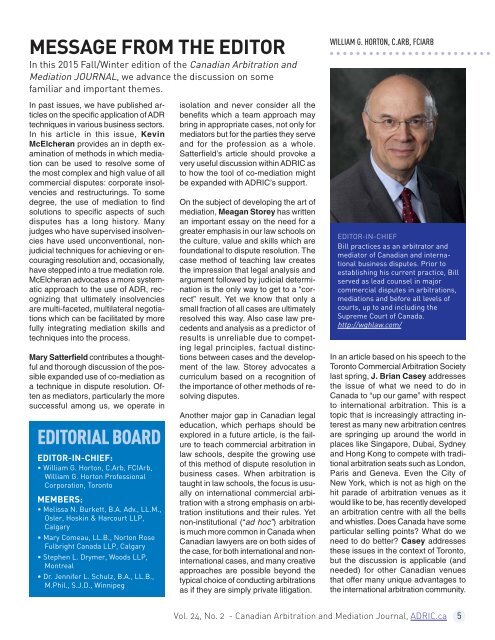NEWS AND EVENTS
WeBhY
WeBhY
Create successful ePaper yourself
Turn your PDF publications into a flip-book with our unique Google optimized e-Paper software.
MESSAGE FROM THE EDITOR ○<br />
In this 2015 Fall/Winter edition of the Canadian Arbitration and<br />
Mediation JOURNAL, we advance the discussion on some<br />
familiar and important themes.<br />
In past issues, we have published articles<br />
on the specific application of ADR<br />
techniques in various business sectors.<br />
In his article in this issue, Kevin<br />
McElcheran provides an in depth examination<br />
of methods in which mediation<br />
can be used to resolve some of<br />
the most complex and high value of all<br />
commercial disputes: corporate insolvencies<br />
and restructurings. To some<br />
degree, the use of mediation to find<br />
solutions to specific aspects of such<br />
disputes has a long history. Many<br />
judges who have supervised insolvencies<br />
have used unconventional, nonjudicial<br />
techniques for achieving or encouraging<br />
resolution and, occasionally,<br />
have stepped into a true mediation role.<br />
McElcheran advocates a more systematic<br />
approach to the use of ADR, recognizing<br />
that ultimately insolvencies<br />
are multi-faceted, multilateral negotiations<br />
which can be facilitated by more<br />
fully integrating mediation skills and<br />
techniques into the process.<br />
Mary Satterfield contributes a thoughtful<br />
and thorough discussion of the possible<br />
expanded use of co-mediation as<br />
a technique in dispute resolution. Often<br />
as mediators, particularly the more<br />
successful among us, we operate in<br />
EDITORIAL BOARD<br />
EDITOR-IN-CHIEF:<br />
• William G. Horton, C.Arb, FCIArb,<br />
William G. Horton Professional<br />
Corporation, Toronto<br />
MEMBERS:<br />
• Melissa N. Burkett, B.A. Adv., LL.M.,<br />
Osler, Hoskin & Harcourt LLP,<br />
Calgary<br />
• Mary Comeau, LL.B., Norton Rose<br />
Fulbright Canada LLP, Calgary<br />
• Stephen L. Drymer, Woods LLP,<br />
Montreal<br />
• Dr. Jennifer L. Schulz, B.A., LL.B.,<br />
M.Phil., S.J.D., Winnipeg<br />
isolation and never consider all the<br />
benefits which a team approach may<br />
bring in appropriate cases, not only for<br />
mediators but for the parties they serve<br />
and for the profession as a whole.<br />
Satterfield’s article should provoke a<br />
very useful discussion within ADRIC as<br />
to how the tool of co-mediation might<br />
be expanded with ADRIC’s support.<br />
On the subject of developing the art of<br />
mediation, Meagan Storey has written<br />
an important essay on the need for a<br />
greater emphasis in our law schools on<br />
the culture, value and skills which are<br />
foundational to dispute resolution. The<br />
case method of teaching law creates<br />
the impression that legal analysis and<br />
argument followed by judicial determination<br />
is the only way to get to a “correct”<br />
result. Yet we know that only a<br />
small fraction of all cases are ultimately<br />
resolved this way. Also case law precedents<br />
and analysis as a predictor of<br />
results is unreliable due to competing<br />
legal principles, factual distinctions<br />
between cases and the development<br />
of the law. Storey advocates a<br />
curriculum based on a recognition of<br />
the importance of other methods of resolving<br />
disputes.<br />
Another major gap in Canadian legal<br />
education, which perhaps should be<br />
explored in a future article, is the failure<br />
to teach commercial arbitration in<br />
law schools, despite the growing use<br />
of this method of dispute resolution in<br />
business cases. When arbitration is<br />
taught in law schools, the focus is usually<br />
on international commercial arbitration<br />
with a strong emphasis on arbitration<br />
institutions and their rules. Yet<br />
non-institutional (“ad hoc”) arbitration<br />
is much more common in Canada when<br />
Canadian lawyers are on both sides of<br />
the case, for both international and noninternational<br />
cases, and many creative<br />
approaches are possible beyond the<br />
typical choice of conducting arbitrations<br />
as if they are simply private litigation.<br />
WILLIAM G. HORTON, C.ARB, FCIARB<br />
○ ○ ○ ○ ○ ○ ○ ○ ○ ○ ○ ○ ○ ○ ○ ○ ○ ○ ○ ○ ○ ○ ○ ○<br />
EDITOR-IN-CHIEF<br />
Bill practices as an arbitrator and<br />
mediator of Canadian and international<br />
business disputes. Prior to<br />
establishing his current practice, Bill<br />
served as lead counsel in major<br />
commercial disputes in arbitrations,<br />
mediations and before all levels of<br />
courts, up to and including the<br />
Supreme Court of Canada.<br />
http://wghlaw.com/<br />
In an article based on his speech to the<br />
Toronto Commercial Arbitration Society<br />
last spring, J. Brian Casey addresses<br />
the issue of what we need to do in<br />
Canada to “up our game” with respect<br />
to international arbitration. This is a<br />
topic that is increasingly attracting interest<br />
as many new arbitration centres<br />
are springing up around the world in<br />
places like Singapore, Dubai, Sydney<br />
and Hong Kong to compete with traditional<br />
arbitration seats such as London,<br />
Paris and Geneva. Even the City of<br />
New York, which is not as high on the<br />
hit parade of arbitration venues as it<br />
would like to be, has recently developed<br />
an arbitration centre with all the bells<br />
and whistles. Does Canada have some<br />
particular selling points? What do we<br />
need to do better? Casey addresses<br />
these issues in the context of Toronto,<br />
but the discussion is applicable (and<br />
needed) for other Canadian venues<br />
that offer many unique advantages to<br />
the international arbitration community.<br />
Vol. 24, No. 2 - Canadian Arbitration and Mediation Journal, ADRIC.ca<br />
5


